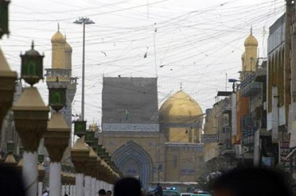Baghdad mosques blast kills 29
BAGHDAD: A wave of bombs targeting Shiite Muslim worshippers at mosques across Baghdad killed 29 people and wounded more than 136 on Friday a month after US troops withdrew from Iraq's main urban centres.
Security officials said the six apparently coordinated blasts occurred outside mosques and prayer centres in and around the capital, including one frequented by followers of radical Shiite cleric Moqtada al-Sadr.
The most devastating attack was in the northeastern district of Al-Shaab, where a car bombing killed 23 people and wounded 107 others, an interior ministry official said.
The mosque itself is occupied by Iraqi special forces, and before the car bomb exploded worshippers, many of them loyal to Sadr, were praying between the building itself and the parking lot.
Witnesses said worshippers had told local police of their suspicions regarding a 1980s Volkswagen Passat, but they were assured the vehicle was safe.
The car bomb exploded a short while later, with witnesses saying local police then panicked and began firing their guns randomly, inadvertently killing three of the 23 who died.
In the aftermath of the attack, local residents shouted verbal abuse at police, saying officers in the area had not done their job, and later demanded that security forces leave.
"We lay responsibility with the Iraqi government, because it is supposed to protect Iraqis," Sheikh Salah Obaidi, a spokesman for the Sadrist movement in Iraq's holy Shiite city of Najaf, told AFP.
"The government's intelligence efforts are not up to the mark."
Meanwhile, in twin bombings at Al-Rasoul Al-Adham mosque at Diyala bridge, 10 kilometres (six miles) south of Baghdad, five people were killed and 15 wounded as they left Friday prayers, an interior ministry official said.
An attack in Zafaraniyah left one dead and six injured, while separate bombings in Kamaliyah and Al-Elam wounded four people each.
Friday's violence was the worst to hit Iraq since a double suicide attack in the northern town of Tal Afar on July 9 killed 35 people and wounded 61.
Attacks in the capital over the past two months have mostly targeted Iraq's majority Shiite community, prompting fears of efforts by Al-Qaeda to reignite the sectarian violence that swept the country in 2006 and 2007, killing tens of thousands.
Violence has dropped markedly throughout Iraq in recent months, but attacks increased in the run-up to the US military pullback a month ago from urban centres, with 437 Iraqis killed in June -- the highest death toll in 11 months.
Attacks remain particularly common in Baghdad and the restive northern city of Mosul.
On Thursday 11 people were killed in two separate bomb attacks, one against a political party's offices in Baquba, north of Baghdad. The other targeted a police station near the Iraq-Syria border.
The same day, a senior US commander warned that security forces would have to be watchful of violence targeting parties and politicians in the run-up to general elections next January.
"Leading up to the elections, we're also going to see some politically motivated violence," Colonel Tobin Green, commander of the US army's 1st Brigade, 1st Cavalry Division, told reporters in Baghdad.
On Tuesday 10 people were killed and 42 others were wounded in a string of attacks in the capital, including a motorcycle bomb near a cinema in a crowded area of the predominantly Shiite neighbourhood of Baghdad Jadida.
Those bombings came as US Defence Secretary Robert Gates visited Iraq to assess the security situation after the American withdrawal from urban centres at the end of June, part of a landmark deal between Baghdad and Washington that calls for US soldiers to leave Iraq by the end of 2011.
On Monday a senior Iraqi army officer, a Sunni tribal chief and two Iraqi special forces soldiers were among six people killed in violence across the country.






